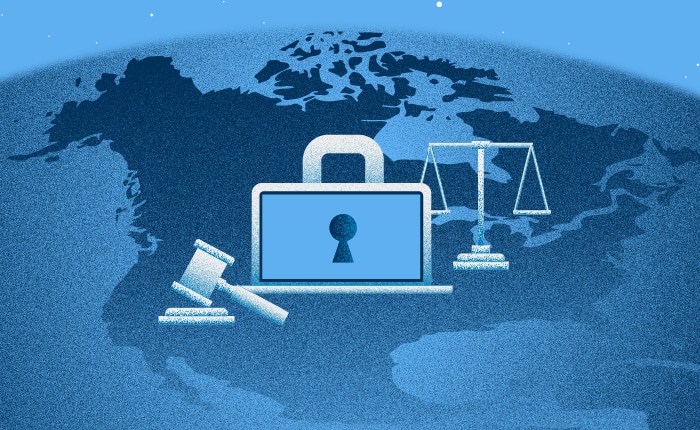With Understanding Data Privacy Laws at the forefront, this paragraph opens a window to an amazing start and intrigue, inviting readers to embark on a storytelling american high school hip style filled with unexpected twists and insights.
In a world where personal data is more valuable than gold, understanding data privacy laws is crucial to safeguarding our digital identities. From the General Data Protection Regulation (GDPR) to the California Consumer Privacy Act (CCPA), these laws dictate how companies handle our information and empower consumers to take control of their data privacy.
Overview of Data Privacy Laws

Data privacy laws are regulations put in place to protect individuals’ personal information from unauthorized access, use, or disclosure. These laws aim to ensure that data is collected, processed, and stored in a secure and responsible manner, safeguarding individuals’ privacy rights.
Purpose of Data Privacy Laws
Data privacy laws serve to protect individuals’ personal information from being misused by organizations or individuals. These laws establish guidelines and standards for how data should be handled, ensuring transparency, accountability, and security in data processing activities.
Key Components of Data Privacy Laws
- Consent: Individuals must give explicit consent for their data to be collected and used.
- Access and Correction: Individuals have the right to access their data and request corrections if needed.
- Data Minimization: Organizations should only collect data that is necessary for the intended purpose.
- Security Measures: Data controllers must implement appropriate security measures to protect personal information.
- Data Breach Notification: Organizations are required to notify individuals in the event of a data breach that may compromise their personal information.
Countries with Stringent Data Privacy Regulations
- European Union (EU): The General Data Protection Regulation (GDPR) is one of the most comprehensive data privacy laws, setting strict guidelines for data protection and privacy within the EU.
- California, United States: The California Consumer Privacy Act (CCPA) grants California residents specific rights regarding their personal information and imposes obligations on businesses handling such data.
- Canada: The Personal Information Protection and Electronic Documents Act (PIPEDA) regulates how private sector organizations collect, use, and disclose personal information in Canada.
General Data Protection Regulation (GDPR): Understanding Data Privacy Laws

The General Data Protection Regulation (GDPR) is a comprehensive data privacy law that aims to protect the personal data of individuals within the European Union (EU) and European Economic Area (EEA). It sets out strict requirements for how organizations collect, process, and store personal data, with the goal of giving individuals more control over their own information.
Main Principles of GDPR
- Consent: Organizations must obtain explicit consent from individuals before collecting or processing their personal data.
- Data Minimization: Only the minimum amount of personal data necessary for a specific purpose should be collected and processed.
- Purpose Limitation: Personal data should only be collected for specified, explicit, and legitimate purposes and not further processed in a manner that is incompatible with those purposes.
- Data Accuracy: Organizations must take reasonable steps to ensure that personal data is accurate and kept up to date.
- Data Security: Organizations are required to implement appropriate technical and organizational measures to protect personal data against unauthorized or unlawful processing and accidental loss, destruction, or damage.
Comparison with Other Data Privacy Laws
GDPR is considered one of the strictest data privacy laws globally due to its comprehensive scope and stringent requirements. In comparison to other laws such as the California Consumer Privacy Act (CCPA) or the Health Insurance Portability and Accountability Act (HIPAA), GDPR provides broader rights to individuals and imposes higher fines for non-compliance.
Examples of GDPR Compliance, Understanding Data Privacy Laws
- Obtaining explicit consent through checkboxes on websites before collecting personal data.
- Implementing data protection impact assessments to identify and mitigate privacy risks.
- Appointing a Data Protection Officer (DPO) to oversee GDPR compliance within the organization.
- Providing individuals with the right to access, rectify, and erase their personal data upon request.
California Consumer Privacy Act (CCPA)
The California Consumer Privacy Act (CCPA) is a state statute that enhances privacy rights and consumer protection for residents of California. Enacted in 2018 and effective since January 1, 2020, CCPA aims to give consumers more control over their personal information and requires businesses to be transparent about their data practices.
Scope and Implications of CCPA
The CCPA applies to businesses that collect personal information of California residents, meet certain revenue or data processing thresholds, and operate in California. It grants consumers the right to know what personal information is being collected about them, the right to request deletion of their data, and the right to opt-out of the sale of their information.
Businesses subject to CCPA must update their privacy policies, provide notice to consumers about their data practices, and implement mechanisms for consumers to exercise their rights. Non-compliance can result in significant fines and penalties.
Rights Granted to Consumers under CCPA
Under CCPA, consumers have the right to:
- Know what personal information is being collected about them.
- Request deletion of their personal information.
- Opt-out of the sale of their personal information.
- Access their personal information collected by businesses.
- Receive equal service and pricing, even if they exercise their privacy rights.
Ensuring Compliance with CCPA
Businesses can ensure compliance with CCPA by:
- Reviewing and updating their privacy policies to include required disclosures.
- Implementing processes to respond to consumer requests regarding their personal information.
- Providing mechanisms for consumers to opt-out of the sale of their information.
- Training employees on CCPA requirements and data handling practices.
- Conducting regular assessments of data practices and security measures.
Importance of Data Privacy Compliance
Data privacy compliance is crucial for organizations to protect the personal information of individuals and maintain trust with customers. Non-compliance with data privacy laws can result in severe consequences, including hefty fines, legal actions, reputational damage, and loss of customer loyalty.
Consequences of Non-Compliance
- Financial Penalties: Organizations that fail to comply with data privacy laws may face significant fines, such as those Artikeld in the GDPR and CCPA.
- Legal Actions: Non-compliance can lead to lawsuits from individuals whose data privacy rights have been violated.
- Reputational Damage: Data breaches resulting from non-compliance can tarnish an organization’s reputation and erode customer trust.
- Loss of Customer Loyalty: Failing to protect customer data can result in a loss of trust and loyalty from clients.
Role of Data Protection Officers
- Data protection officers play a vital role in ensuring compliance with data privacy laws by overseeing data protection strategies, conducting risk assessments, and monitoring compliance efforts.
- They serve as a point of contact for supervisory authorities and employees on data protection matters.
- Data protection officers help organizations navigate the complex landscape of data privacy regulations and implement necessary measures to safeguard personal information.
Tips for Staying Updated
- Regularly Monitor Regulatory Changes: Organizations should stay informed about updates to data privacy laws and regulations to ensure compliance.
- Participate in Training Programs: Providing employees with training on data privacy best practices can help maintain compliance and reduce the risk of breaches.
- Engage with Industry Networks: Joining industry groups and networks can provide valuable insights into emerging data privacy trends and compliance requirements.
- Conduct Regular Audits: Regularly reviewing data processing activities and security measures can help identify potential compliance gaps and address them promptly.